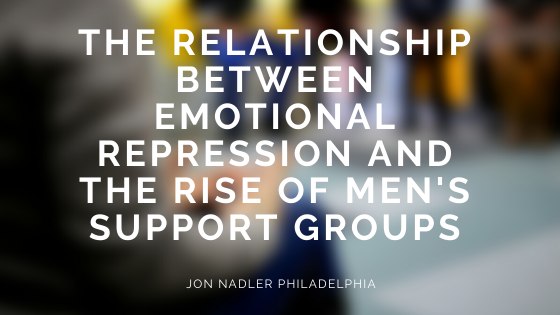When asked about the reasons for engaging with men’s support groups, many attendees and men’s group supporters are quick to mention the lack of forums for personal expression that currently exist in American society. And as male support groups become more and more popular, many men are discovering the power of disavowing toxic mentalities related to masculine behavior.
A Toxic Culture Undergoes Scrutiny
As a part and parcel of American society, there can be no doubt that the culture at large often reaffirms faulty and destructive beliefs about what men should be and how they should act. According to mental health professionals, these faulty beliefs have created a crisis among males of all ages and backgrounds.
Indeed, decades on from the emotionally repressed era of the 1950s, men in the US still tend to see themselves as individuals required to repress their feelings at all costs. At the present time, a diagnosis of depression can still result in individuals being blocked from joining the military or local police and firefighter organizations. It can be the death knell of a political career. It can dash any hopes of career success in the business world.
In the minds of young men, in fact, the options with regard to mental health issues are clear: Repress your difficult emotions, and you will be accepted in society; show vulnerability, and your path forward will be extremely difficult.
The Origins of Toxic Masculinity
But how did we get to this point? As the suicide rate among males in the US skyrockets, deep questions about the stigmatization of self-expression are beginning to emerge in the wider culture. If rates of self-harm are tied to emotionally repressive beliefs, as they undoubtedly are, why are such beliefs reinforced and even celebrated within the male population? Why does the American public clamor for more and more television programs and movies about “strong, silent” men each year?
The Cracks Begin to Show
Undoubtedly, the belief that men should not express their pain is a remnant of an earlier time. As recently as the 1970s, most members of the male population within the United States were seen as either hardworking providers or soldiers at the ready. In this warrior-worker culture, strength was seen as an essential trait for survival. But as the Vietnam War scarred a new generation of young men struggling to cope with cases of PTSD and depression, societal attitudes towards emotional repression began to be questioned.
Male Support Groups and a New Era of Emotional Expression
Under these circumstances, it is little wonder that so many men are beginning to take a positive view of male support groups. At meetings organized by these groups, men are not deemed “weak” if they express their thoughts and emotions. They are not shunned for approaching difficult topics such as depression or suicide. Their manhood is not called into question for expressing doubt or fear.
Saving Lives Through Lessons of Self-Acceptance
And many adult males are finding that the cultural shift embodied in such support groups can be life-changing and even life-saving. Simply put, the ability to express one’s feelings and concerns without fear of exclusion or retribution can be therapeutic in the extreme. Indeed, men who attend such groups often find that the support that they receive is more effective for treating cases of PTSD, depression, and anxiety than SSRIs or private therapy sessions with trained psychiatrists and psychologists.
Our society may have very far to go in terms of rectifying unhealthy and damaging beliefs about male responsibilities, but good support groups appear to be undoing some of the harm that has been created by such beliefs. For people who have lived with the damage that emotional repression can bring about, that is very good news indeed.


